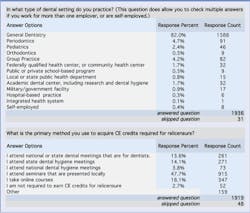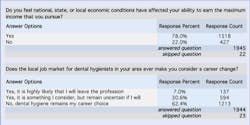Annual salary survey
RDH eVillage readers comment on job trends in their areas
According to RDH’s sister publication, RDH eVillage, the average hourly rate for a dental hygienist in the United States is $42.01.
But a variety of demographic factors influence hourly rates in the United States, and RDH eVillage published four reports in late 2011, breaking down the numbers on a state-by-state basis or based on metropolitan areas.
The RDH eVillage reports can be viewed at DentistryIQ.com by searching for “salary survey 2011.” Some of the overall national responses to the survey are presented along with this article.
In January 2011, RDH published a similar article as this one titled, “The Mood Out There.” Without question, the national economy has affected dental hygiene too. Without focusing on a “mood,” this article includes comments about employment trends in specific states.
Approximately 700 of the 1,900-plus dental hygienists responded to the open-ended question, “Would you like to make any comments on trends regarding salaries, employment issues, etc., in your area?” Many excellent observations were provided, but, due to space considerations, we narrowed those comments down to just a few from selected states.
Arizona
• Due to the fact that hygienists are having a hard time finding jobs in Tucson, many are willing to travel a distance even to rural towns, where pay is at a higher hourly pay.
• The market is continuing to be flooded with new grads who are willing to work for as low as $25 per hour. There are new schools popping up everywhere.
• The temporary placement agencies I use have told me that the dentists are seeking hygienists with less than 10 years’ experience and pay no more than $38 an hour without benefits.
• More and more dental hygiene schools have opened in our area since I graduated 10 years ago. Schools are putting an emphasis on inflated salary figures in their ads to potential students.
Arkansas
• My employer is thrilled about the surplus of hygienists in our state and has changed our reimbursement from daily to hourly.
• My multiple doctor practice is now hiring hygienists right out of school at lower salaries and cutting back hours of more experienced hygienists.
California
• I live in Los Angeles with five years of experience and graduated from a top hygiene school. Finding a job has become impossible.
• I looked for a job for one year, and was told at a couple of interviews that they had over 200 applicants. Times are very hard in other offices I have temped in.
• Our dental practice has experienced a decrease in patients coming in every three months due to economic issues in their lives. The hygienists in our office have been given furlough days if the schedule is not full.
• Hygiene schedule is full; dentist schedule is down by a quarter. Many patients are unemployed or losing dental benefits.
• Dentists are hiring newly graduated dental students to do hygiene. I think they pay them lower. Their skills are lower!
Colorado
• I just moved to Colorado Springs in March 2011. I had practiced on the western slope of Colorado and watched my hours go from 20 hours a week to six hours a week during 2010. It took a move and 3.5 months to find another job.
• There is a definite surplus of dental hygienists in the Denver area. I have noticed from recent job postings that the average wage has dropped by $5 an hour (ouch!). They are trying to open up two more fast track hygiene programs here, which will flood the market even more.
Connecticut
• Most new graduates are temping because they cannot find a permanent position.
• I see more hygienists changing their profession and/or going back to school. It’s been a difficult two years.
• Graduating hygienists are willing to work for a lot less hourly with little or no benefits just to be employed. This trend is driving down my current salary and job position.
Florida
• I love my profession, but it’s a sad day when I compete with 20-year-old “certificate graduates” who have no experience and very little knowledge, but are willing to work for half the national average.
• In Florida, there are 21 hygiene programs churning out too many hygienists for the market to bear, resulting in no jobs being available and salaries being held down to the point where they have not kept up with the cost of living.
• Adjusted for inflation, I make less than half what I made 20 years ago, and I have one of the best jobs in the area. I now think of hygiene as my “volunteer” work. I cannot understand how it is that our tax dollars are going to support pricey dental hygiene programs that cannot place their graduates in any, I mean any, full-time positions with benefits.
Georgia
• Georgia has a large number of colleges with dental hygiene programs; it has killed the market for dental hygienists and is driving down wages, benefits, and long-term employment opportunities. Based on many hygienists I know who are trying to get or keep work, I have noted a large number of dentists who “require” the hygienist to perform illegal duties in order to keep their jobs (work while dentist is away from the office, adjust nitrous oxide, etc.).
• I recently moved back to the Atlanta area after 12 years, and have found it very difficult to find a job. Dentists complain of having to pay for my 20-plus years of experience and often hire girls just out of school at a lower price. I am willing to take a pay cut just to compete for the jobs.
• The hygiene field is so saturated in the metro Atlanta area. I have been unable to find a job all year. I never thought I’d say this, but I wish all hygiene programs would close for about five years to allow all of us unemployed to be able to find jobs at the pay we deserve.
Hawaii
• I’ve been in practice for 27 years, and this is the first time I have seen a shortage of jobs, mainly due to the economy.
• I worked with a state public health program that was completely eliminated (after 35 years). The new trend toward FQHC community health centers is not employing dental hygienists or a replacement for public health programs. Prevention has taken a big hit with the economic crisis, which is the opposite direction things should be headed. Health departments need to increase the efforts on prevention.
• Recent hygiene graduates are expecting higher salaries starting right out of school.
Idaho
• In the last year, my benefits have been reduced, hours increased, work required increased, and the attitude of the doctor is passive/aggressive. With the introduction of a technical school with an 18-month program, there are no hygiene openings and compensation is going down because of the surplus.
• The job market is completely flat in our area. There are a lot of RDHs working as dental receptionists or assistants, for vets to clean animals’ teeth or any other job they can get. We are totally saturated, and I think it goes throughout the state. Dentists are hiring new graduates at a much lower rate than established RDHs and firing some of their long-term RDHs to hire someone who will work for less. This issue is partly due to the economy and partly due to overproduction of dental hygiene schools (with decreased standards that promise degrees in shorter times and easier classes and large salaries).
Illinois
• I believe the number of dentists who are not hiring hygienists is due to the fact that hygienists who are new to the market feel they should be making top dollar, have no work ethic, and feel entitled to the best of everything. Seems as if the average hygienist is now in the field about five years because of “the tedious job and hours.”
• There are too many hygiene schools in the state of Illinois. There are not enough jobs to go around for the number of hygienists out there. The doctors are starting to pay peanuts because they can now. They have hygienists knocking down the door for jobs. We now have hygienists who won’t be able to start practicing immediately after graduation. They will lose a lot of their hygiene knowledge and scaling skills in the time between graduation and the time they find a job, which may be years.
• This is the first time in 35 years of practice that new grads remain unemployed a year after graduation, pay is stagnant, practices are struggling financially, and patients are unwilling to have necessary work completed and want to come only once per year, if at all, due to finances.
Indiana
• There are many new hygiene graduates in this area that are unemployed. We have three nearby dental hygiene schools. There should be a minimum distance required for hygiene schools. The dentists like to charge fees in the 95th percentile but they do not pay their employees the same.
• I have enjoyed my dental hygiene career over the past 20 years, but I can no longer financially support my family with my days and hours being reduced. I plan to leave the field for a factory job where I can recieve benefits and guaranteed hours.
• Regarding hygienist positions in the area, traditional methods of newspaper ads no longer work; rather it is about networking with fellow hygienists, sales reps, and online postings. There are too many new hygiene programs opening at tech schools giving delusions of “all the jobs out there.”
Iowa
• Hygiene jobs are scarce in my area. The prospects for new grads are glum. If I were able, I would job share to give a new grad at least a part-time position.
Kansas
• I was let go from my job about four months ago so the dentist could hire a friend. I have applied for 30 jobs, part time or full time, and have been called for two interviews. We have four dental hygiene schools within an hour’s drive. The ones being hired are the new ones who won’t expect to be paid as much.
• In Kansas, not only do we have a surplus of dental hygienists, we also have “supragingival” scaling dental assistants that are allowed to “scale” above the gumline and do prophies. Many practices do not employ hygienists at all and only have “scaling assistants.” The patients are, for the most part, unaware that they are not receiving the approprate treatment and are charged regular fees. The dentists pay the scalers a lesser wage and then have a larger profit margin. It is distressing!
Louisiana
• At one time, I was a $100,000 hygienist. Since the economy has gone so bad, it seems like the dentists are holding their hygienists back from maximizing their production capabilities and also not paying the daily rate hygienists deserve. It seems like a no-win situation for anybody nowadays.
Maine
• The schools continue to enroll dental hygiene students even though the market is flooded by graduates who cannot find employment.
Maryland
• There are no jobs in the Baltimore area. Employers are not giving any benefits. I’m responsible for my own health and retirement insurance. I currently work only three days a week; I’m unable to find another job for one or two days a week.
• As a hygienist, you have a set amount of hours that your employers request you to be present. However, if the schedule falls apart, you are expected to clock out or leave for the day, greatly affecting your income. Also, very rarely will you have a retirement benefit so it is up to the individual to be proactive about saving for retirement. If there is an increase in production or revenue, the dentist’s income will change, not yours.
Massachusetts
• Salaries are stagnating. I am doing more work for the same salary and have not had a raise in almost 4.5 yrs. Very discouraging, and I will probably leave the profession within the year.
• I feel that the two-year dental hygiene schools are graduating too many hygienists and that there are no jobs in my area.
• Doctors know they can get hygienists easily, so they don’t want to pay current wages if they can get away with it.
Michigan
• I graduated over two years ago and have yet to find a job, including consistent subbing due to my limited experience.
• I have not had a raise for over six years and was told I would never get another raise. Even though my hygiene production was up over $20,000 one year, I was told that raises are not based on production. The doctor has raised his fees every 1 1/2 to 2 years. There are no other jobs to be found in our small town rural area. We stay with our employers because we need work. I have had a cut in benefits also. The doctor knows I won’t look for another job because I would have to drive over 25 miles or more to find one.
• Really? Do we still have a dental hygiene program in every city? Yup, we do!
• My schedule is almost always full. Management knows they can hire someone for a lot less, since new graduates are dental assisting since they can’t find work. The Detroit area has really been hit hard economically. They want us to “sell” fluoride treatments and take extra perapical pictures, adding $42 for fluoride and the extra $32 for the periapicals on anteriors to the $61 bitewing fee. Dentistry isn’t what it used to be. I wish to remain anonymous for my honesty on this topic. I have been a hygienist for 13 years and have never seen anything like this.
Minnesota
• Hygienists who have retained their jobs seem to be making higher wages. Many dentists I’ve met who have not hired in some time are unaware of the surplus of dental hygienists or the drop in salaries. Those who are aware have significantly dropped their salaries due to supply/demand. I’m also hearing preferences for RDHs with at least two years over RDHs with significantly more experience. Two office managers shared with me their doctors’ concern with higher insurance premiums for older RDHs as well as higher salaries and were instructed to screen them out of applicants.
• Benefits continue to be cut annually, whether it is fewer days of vacation or a still higher deductible medical insurance plan. Whenever an opening for a hygienist position presents itself, there are usually at least 150 applicants. So changing employers is not really an option. My earnings are not keeping up with the changes in the cost of living.
• There are 10 hygiene schools in Minnesota and the supply of hygienists far exceeds the demands of the job market. I wouldn’t recommend dental hygiene as a career unless employment opportunities improve.
• I moved from Iowa to Minnesota and my hourly salary dropped from $28 to $24.50. Minnesota has too many dental hygiene schools and not enough hygiene positions.
Missouri
• Due to the economy, I received a 17% cut in pay in December 2010.
• The profession of dental hygiene is in trouble. There are so many exciting things happening in hygiene right now, but I don’t see them as having enough momentum.
• I see salaries leveling out. There is a glut of hygiene schools within 150 mile area. I am not encouraging people who are considering health care to enter dental hygiene unless they are really interested in the dental field.
Nebraska
• A growing trend for doctors is to classify RDHs as independent contractors, which is illegal in most states per IRS rules, state departments of labor, etc. A growing trend for doctors is to refuse to withhold payroll taxes and to provide W-2 or 1099’s as required by law, instead using us as a “deductible business expense,” which is, of course, in violation of IRS rules. Unfortunately, the IRS only investigates on case-by-case complaint, leaving the RDH vulnerable to blackballing. Most dental hygienists just accept the loss and move on, leaving the employer to continue in this fashion.
• We usually raise prices every year by 3%. This year, we raised prices by 6% and I only received a 2% raise even though my production was higher than the previous year! Farming is good, so dentistry is good in rural Nebraska right now.
New Hampshire
• I used to work 36 hours every week. Now, I work between 10 and 26 hours a week. Business is slow. The dentist now does a lot of the prophies, so he does not have to pay me.
• Long before the economic problems, the local dental hygiene school in Concord, N.H., increased its class size for dental hygiene students. Since then, we have had very few jobs available in the area. They should have studied the effect on the area before they made such an important decision.
New Jersey
• My area is overrun with hygienists, and it is very hard to find a job. Many doctors are doing hygiene themselves because their schedules aren’t full and don’t want to pay an RDH even on commission!
• I believe that many dentists in this area are using a weak economy as an excuse to cut dental staff and to not give raises. I believe this reflects the American business culture that has become so prevalent in the last two years. I also believe that dentistry raised fees to a point where many middle class Americans need to think twice before they agree to dental treatment because of the expense. In this area of New Jersey, a root canal on a maxillary molar averages around $1,100. Now the patient will also need a post and a crown for another $1,500. While dentistry can argue and justify these fees, people just don’t have $2,500 to spend.
New Mexico
• My hours are being cut. There are new hygienists that are getting minimal education through vo-tech schools and will soon flood the job market, even in rural areas, thus decreasing my income further.
• There are so many technical school training programs that have recently opened up in New Mexico that it is almost foolish to think of dental hygiene as a profession that requires an advanced degree or training for that matter. I could have been a welder.
New York
• Full-time employment seems to be of the past. I am currently working in four practices to work five to six days.
• Schools are letting cheaters and students that fail exams slide by with second and third chances. The market is flooded, and it would help if schools didn’t let these people graduate. But they do it for money.
• We have more companies leaving our area than coming. We have definitely seen a decrease in the number of patients for that reason. I sure hope our economy turns around soon for all of us.
• The market is flooded with hygienists right now, and a college is being stopped from opening a new RDH program. Dentists are offering less and less, as there are more and more hygienists available that just want a job and are willing to take a pay cut to get one.
North Carolina
• Most dentists say they are hoping that we will have such an abundance of dental hygienists that we will be willing to make what we did 20 years ago. I actually am making less than I did 20 years ago without benefits.
• The Durham/Raleigh area has not been affected by the economic crisis the same way as many rural areas of North Carolina and many areas throughout the nation. Due to the many great state colleges located here and the heavy concentration of highly educated folks living in this area (with the Research Triangle being here), I think dentistry for many (at least those who are well established) seems to have seen, at the most, some mild decline in business and work overall. It is a bit challenging for some offices, due to the saturation of dentists in the area as well. However, with an economic crisis like this, those less established offices have probably seen the worst hit.
• The market for dental hygienists is flooded statewide. There are 13 dental hygiene schools and one dental school in the state. There is a new dental school but the dean was just fired for misappropriated use of funds. The hygienists I have worked with are frustrated about finding permanent work. Most substitute until they find a permanent position. The salary in our town has decreased hourly over the past 20 years. Dentists have their “pick of the litter” and some hygienists I know that are recent graduates have not found a job since they graduated two years ago.
North Dakota
Everyone is going to part-time employees so there are no benefits offered! It is also becoming more money orientated for the employer than patient orientated.
Ohio
• Because many people have lost their dental benefits, the doctor I work for has been discounting their cleanings by 50%, charging only $75 for four X-rays, cleaning, and exam. To compensate for the loss, I have been given two to three more patients a day, only 45 minutes for scaling and root planing, and I’m lucky if I get lunch some days (10 minutes most days). After practicing for 17 years, I hope this isn’t the new trend. I am overworked and stressed, and patients are not getting the proper care.
• Many hygienists are unemployed in their chosen profession for over a year after graduation and I’ve heard some longer — up to over two years. The good jobs are very difficult to come by. It’s been very difficult at our office to overcome the effects of the recession and high unemployment rate, but we are trying!
• I wish I would have known that I would not be able to find a new job and be stuck in the same job. I would have stayed as a dental assistant. I was appreciated.
Oklahoma
• I was surprised to make $325 in Oklahoma compared to $350 a day in California last year.
• My schedule is fully booked for three months out. I send out postcards two to four weeks in advance and call the day prior, but I have holes daily. I have seen a significant reduction in my salary.
Oregon
• I am opening the first independent dental hygiene spa in Portland. Oregon has a limited access permit (the name will change in January to Expanded Practice Dental Hygienist). There are over 200 now, and many dental hygienists are working in alternative settings and working toward opening their own practice.
• Oregon is terrible for finding dental hygiene jobs. OHSU discontinued offering dental hygiene and the board approved opening programs in schools like Apollo. It is demeaning the profession of dental hygiene and there are way more hygienists than available jobs.
• I am a union member, which is very unusual for our profession. Because of our union contract, my job, wages, and benefits are competitive and dependable, not subject to the fears and whims of a small business owner/dentist.
Pennsylvania
• I have been employed in the same office for 5-plus years. I went from having insurance for me and my husband to not having either anymore and have been taken off salary. I keep spiraling downhill at this office. The dentist blames the economy. I have never been demoted at a job before as the years of service increase.
• No dentists hire full time anymore so they don’t have to provide benefits. There are too many hygienists and not enough jobs.
Rhode Island
• I am fortunate to be working in a very busy practice. I have heard from other hygienists in our state that their hours are being cut and jobs are hard to find. I believe that our office is an exception to the rule. These hard economic times have hit many practices pretty hard.
South Carolina
• Jobs shortage in the area is due to influx of students from other areas that choose to stay here rather than return to their home area to work.
Tennessee
• Salaries are decreasing in east Tennessee due to the number of dental hygiene graduates. The market is saturated and there are many unemployed dental hygienists.
• In our state we have eight dental hygiene schools, and it is too many. I strongly feel that CODA needs to do an environmental scan to determine if schools need to open, because, with the surplus of schools, there are too many hygienists and not enough jobs throughout our state.
Texas
• Too many dental hygiene schools = not enough jobs = low pay = no benefits ... will have to change professions.
• Some of the dentists in the area are so slow that they are doing the prophies themselves and getting rid of their hygienists. My dentist has given us three months, and he will either shut down or cut to two, maybe three days per week. I have tried for the last two years to find another job or fill-in days, and I have had no luck. We get at least one to two hygienist resumes per week in our office and many more assistant resumes. Patients that were very regular for years are no longer coming in or are very irregular.
• The two-year programs seem to allow every high school dropout or distracted person looking to earn more than a waitress’s salary to now become a dental hygienist.
Utah
• It is more difficult to find jobs due to the economy, but I feel that with more hygienists in the workforce, maybe everyone will start working together to expand hygiene into more areas such as public health, pediatrician offices, hospitals, etc.
• New hygiene programs as well as existing programs increasing class sizes have caused and will continue to cause a surplus of hygienists. Quality of applicants has gone down due to the size of classes. National magazines keep stating that hygiene is one of the top careers for the future. Where do they get their info? I know of many hygienists out of work or looking for more work.
Vermont
• There are not many jobs for hygienists, because there are not any new practices opening. We need more dentists, and then hygienists would have more jobs available.
Virginia
• The dentists are taking advantage of the surplus of dental hygienists in my area and “low balling” salaries, and they are cutting back on benefits because there are new graduates taking any salary they can get just to get a job. Shame on the dentists!
• Took reduction in pay to keep our practice going. We were in the red last year from the economic downturn. We actually had benefits taken away. Just grateful to have a job.
• There are literally no job opportunities available unless someone moves away, has a baby and does not return, or dies! When I had to relocate to southwest Virginia, I found that there are no jobs available anywhere except the Washington, D.C., area or the other end of the state, nor are there any jobs available in eastern Tennessee. The fact is there are way too many dental hygiene schools in each state; I see it like having a Walgreens on every corner. There are so many hygienists buzzing around like a swarm of bees trying to find a place to land! I started taking a course in electronic health records, because I fear that I will never have a decent dental hygiene job again. I felt that I needed to educate myself in another field since dental hygiene is a lost cause.
Washington
• WDS cut reimbursement fees by 15% in Washington only. This is hurting a lot of practices here. We are down $30,000 from last year. I don’t foresee the newer hygienists fresh out of school being paid as much as someone who was already practicing before the cut fees.
• I was a 4-days-a-week hygienist. In June, I was informed that my hours would be cut in half. We were also informed that we no longer had any vacation time, no holiday pay, and would be losing our health insurance in September. Part of it is to blame on the economy but part of it is the management.
• Too many RDHs in our area, plus the 30% reduction in production over the past 18 months have equaled pay decreases, not increases. Plus the stress to produce, produce, produce is about to put an end to my hygiene career.
West Virginia
Just opened a new RDH program. Jobs are hard to find. I was released from my job this month due to “restructuring of the dental hygiene department,” which really means I was replaced by a younger girl who just graduated. This tells me he wanted to pay less salary.
Wisconsin
• Employment for hygienists in our area is very limited. There are too many technical schools churning out hygienists every year. Another one just opened this past year. So many new hygienists are not able to find any jobs out there right now. I know of two hygienists who have left hygiene for other jobs recently.
• Most jobs are part time and are found by word of mouth in my area. I live in a town of about 11,000, 20 minutes from a larger city that has a dental hygiene school. There is a glut of hygienists in our market. I am lucky to have been working where I do for a long period of time.
• I have heard many complain they can’t find jobs. With a local hygiene school in the area and the economic condition of the country, dentistry is feeling the strain. There has been discussion of closing the dental hygiene school in our area, which would be a terrible shame due to how many low income or uninsured patients the students treat each semester.
Wyoming
• The salaries in Wyoming are not reflective of the education/training of the dental hygienists. There are dental assistants who make the same, if not more, than the dental hygienists. Hygienists in this state tend not to like to rock the boat, so they do not work as a group to raise salaries. Dental hygienists are still not perceived as professionals by the dentists in the state.
• Different parts of the state have higher wages than others. We have two dental hygiene schools, and there are more RDHs where those schools are located. Our main place of employment is in the office setting, dental hygiene schools, and limited public health opportunities.
Past RDH Issues








